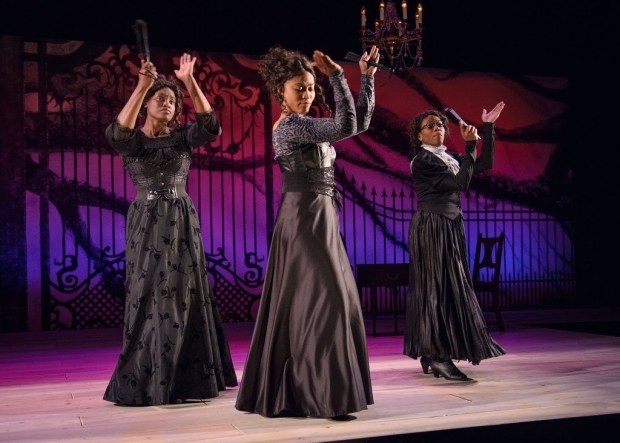The House That Will Not Stand

(© Michael Courier)
At the beginning of The House That Will Not Stand, the salacious opening guitar lick of "When Doves Cry" plays as a wealthy white man's corpse is lowered onto the stage from above. That corpse is the recently deceased Lazare Albans, a New Orleans fur trader. In death, he is the only man or white person to appear in Victory Gardens' New Orleans-set production of The House That Will Not Stand, inspired by Federico García Lorca's The House of Bernarda Alba.
In the early 19th century, New Orleans was in a tempestuous state of transition. As Franco-Spanish colonial law gradually gave way to the rigors of American statehood, free people of color, especially women, found their freedom on shaky ground. In the 1830s, newly widowed Beartrice Albans (Lizan Mitchell) runs a house full of women dreaming of freedom. Two of her daughters, Agnès (Diana Coates), and Odette (Aneisa Hicks) want to go to the quadroon ball to find love, specifically with a wealthy white man who can offer her a type of common-law marriage called plaçage, while French law still allows it. Her third daughter, Maude Lynn (Angela Alise), a self-styled Christian martyr, laments her failure to free her father's wicked soul.
Beartrice knows from a lifetime of experience that plaçage can be little better than slavery, and that with American law looming, any rights gained from such a union are tenuous at best. Beartrice's sister, Marie-Josephine (Penelope Walker) is kept locked in the attic because of her alleged madness, and schemes a way to escape from under her sister's thumb. Meanwhile, Beartrice's slave Makeda (Jaqueline Williams) fights to keep the literal freedom that was promised her upon Lazare's death. A neighbor woman, La Veuve (a wickedly witty Linda Bright Clay) acts as antagonist, seeking to right the wrongs that Beartrice did her long ago.
As Beartrice, Lizan Mitchell is fearsome and commanding, lashing her household together as they face the literal and figurative storms. Her daughters are a tight trio, whether bickering, fantasizing, or singing "Save Regina" over a trap beat. All three are great fun, but the second act belongs to Aneisa Hicks, who gives a marvelous performance as delicate Odette finds her voice. Jaqueline Williams is strong throughout as Makeda, who dabbles in voodoo while serving the deeply Catholic family.
Punctuating the stylized language of 1836 New Orleans with contemporary turns of phrase, Marcus Gardley's script is rich and inventive. Lorca's surreal and poetic monologues translate well into the setting of The House That Will Not Stand, especially when delivered ecstatically by Walker, a powerhouse in a smaller role.
Victory Gardens' artistic director Chay Yew crafts a spirited production. Sound designer Christopher Kriz gets to have fun, as modern music is sampled and mixed with new compositions by Fabian Obispo. Choreographer Breon Arzell combines period style and contemporary moves cleverly. The ensemble is elegantly costumed in mourning black by Izumi Inaba, and when the girls sneak out to the quadroon ball, their party clothes are an interesting combination of modern pieces and period silhouettes. The only misstep in this otherwise magical production is the underwhelming and static set by Yu Shibakai, which pairs a flatly painted Live Oak with a few chairs and the odd chandelier. While it evokes New Orleans adequately, the decision not to show the titular House at all is questionable.
As a storm and a vengeful ghost roll into Beartrice's estate, the tense question of who or what will be left standing is tangible. Gardley should be commended for building a fresh new play on the site of a well-loved classic, and Victory Gardens’ sensuous production is not to be missed.











